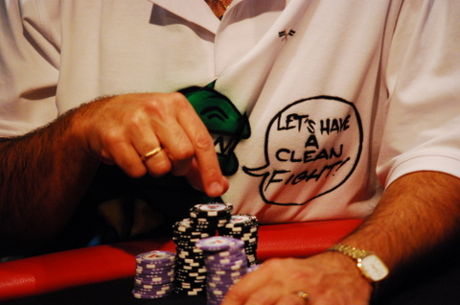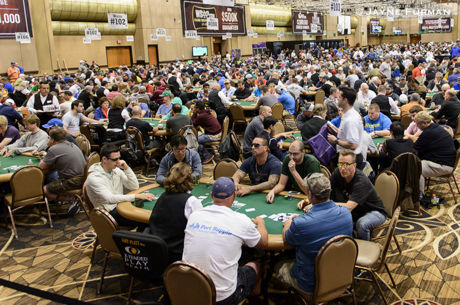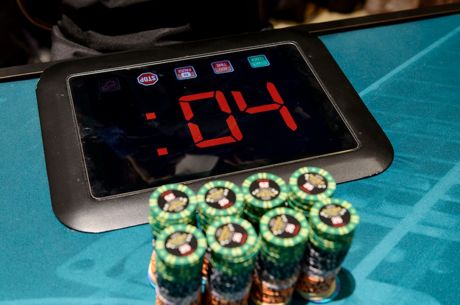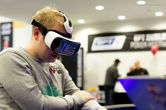Can You Know What Their Cards Are By the Way They Hold Their Eyes?

Last week on National Public Radio��s Fresh Air, host Terry Gross interviewed a Harvard neurologist who is studying autism-spectrum disorders, and one of his subjects, John Elder Robison, who wrote a book about his experience.
In a nutshell, the experiment involved stimulating specific areas of the brain with magnetic energy. The resulting electrical currents would either enhance or inhibit certain brain circuits.
People with autism-spectrum disorders often have difficulty understanding the point of view or state of mind of others. One manifestation of this is an inability to recognize other people��s emotions. Addressing this, the experimenters tried electromagnetically inhibiting a part of Mr. Robison��s brain that is thought to suppress emotional reactions �� something that��s needed, for example, when you have to carry on with some task in spite of feeling terribly sad or frightened.
The result was that he was suddenly able to feel an emotional response to music. And, of particular interest here, he was newly able to recognize other people��s emotions, which had always been something of a blind spot to him before. That result raised the intriguing possibility that the autism-spectrum emotional deficit isn��t a lack of intrinsic emotional capability, but overactivity of the brain circuits that are called on to suppress emotions when necessary.
Hearing this program on the radio got me thinking about how much successful poker depends on being able to get inside the thoughts and emotions of other players. It��s a general human skill that is so natural to most of us that we rarely think about it, any more than most of us think about being able to walk.
Reading Others�� Emotions in Poker
On the TV series Star Trek: The Next Generation, the main characters frequently played poker together. (For a discussion of the role poker played in the show, see here.) One of the characters, ship��s counselor Deanna Troi, is half-human, half-Betazoid (a humanoid species with telepathic abilities). Because of having a human father, she is not really telepathic, but only empathic, able to perceive with exquisite sensitivity the emotions of others.
One would think that she would have a distinct advantage at poker. Being able to sense strength or weakness �� or confidence or fear �� in her opponents should allow her to distinguish reliably bluffs from value bets, and tell her who has a hand weak enough that they can be bluffed off of it. Unfortunately, the show never said anything about how this ability affected her poker playing, so we��re left to speculate.
We do, however, have examples of poker players who are at the other end of the scale in being able to sense others�� emotions �� i.e., those with autism-spectrum disorders. They are less able than average to see a situation through the eyes of another person, and less able than average to correctly read others�� emotions.
One such player is a friend of mine, Tony, who blogs about his poker successes and failures. (I am revealing no secrets; he is open about his Asperger syndrome diagnosis.)
Tony is a competent player, able to beat Las Vegas tourists for enough money to have kept himself financially afloat for many years now. But reading hand histories in his blog, it becomes clear that he stumbles between ��Level 2�� thinking and ��Level 3�� thinking. (For an introduction to the meaning of those terms, see ��Multiple-Level Thinking in Poker: At What Level Are You?��)
Level 3 is typically described as being where you understand what an opponent thinks you have and what you��re doing. It requires putting yourself behind the other player��s eyes, knowing how that player is perceiving you. When Tony describes what he thought another player was thinking, it��s often obvious to neurotypical readers �� even without having been there �� that he is likely to be quite far afield in these judgments.
I have long found it remarkable that he is able to eke out a living at poker, when playing with such a handicap. I doubt that I could do it, given a similar deficit.
I sent Tony an early draft of this article, asking if he wanted to add anything else. He replied, ��When I play poker, I've tried to get better at knowing what the others have. I've found I��ve often gotten myself into trouble when expecting others to play a hand the way I would, and often this has affected me.��
This peril is not unique to those on the autism spectrum, though it seems likely to be a more pronounced characteristic of their play. See ��The Danger of Projecting Your Own Playing Style Onto Your Opponents�� for a recent PokerNews article on that very subject.
Noticing and interpreting poker tells is all about getting inside the minds of other players. You have to use the clues they��re giving off, subtly or blatantly, to figure out what they��re thinking, and sometimes even what they��re trying to get you to think of them.
This task is related to, though distinct from, that of recognizing another��s emotional state. Being able to do so is valuable in poker because it��s useful to know who at the table is angry or happy, relaxed or tense, bored or engaged, tired or energetic, or desperate or confident, as those emotional states will powerfully affect how they play.
Test (and Improve) Your Ability to Read Others�� Emotions
How are you at reading other people��s emotional states? A few years ago, one of the New York Times blogs ran a test which asked the reader to identify the emotion being displayed in photographs of people��s eyes, with the rest of the faces cropped out. I did acceptably well on it, though my girlfriend did considerably better. As you might guess, she��s a more natural ��people person�� than I am. Here is that quiz, if you��re curious.
After you try that quiz, consider taking on another exercise. The next time you play live poker with strangers, whether in a tournament or a cash game, as soon as you sit down, quickly look in turn at each of the other players, and try to sum up the emotional state of each with just one word, as judged by their facial expressions. Then, as you gather more information over time �� from their conversation, body language, and so on �� see if your rapid initial judgment was correct.
The titular Gambler in the famous Kenny Rogers song ��made a life / Out of readin�� people��s faces / Knowin�� what the cards were / By the way they held their eyes.��
Can you do the same? If not, the good news is that it��s a learnable skill, at which anybody can get better with diligent practice �� even those with emotion-related disabilities.
Robert Woolley lives in Asheville, NC. He spent several years in Las Vegas and chronicled his life in poker on the ��Poker Grump�� blog.
Want to stay atop all the latest in the poker world? If so, make sure to get PokerNews updates on your social media outlets. Follow us on Twitter and find us on both Facebook and Google+!









